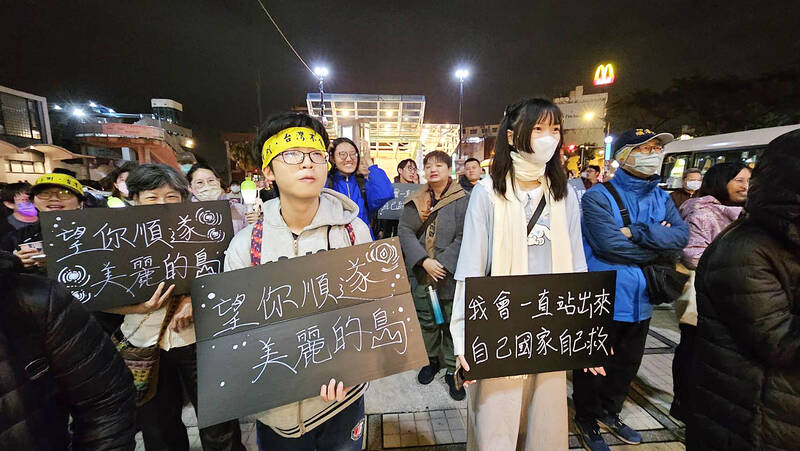Activist groups commenced a new series of “Bluebird movement” activities in Taoyuan on Monday night, beginning nationwide public forums and recall drives aiming to oust Chinese Nationalist Party (KMT) legislators who “rammed through three amendments to destroy Taiwan’s democracy.”
At a parking lot behind Taoyuan Railway Station, Economic Democracy Union (EDU) convener Lai Chung-chiang (賴中強) criticized “those power-abusive KMT legislators” and told the audience that “we must hold them accountable for their actions in the legislature... We cannot allow them to deprive us of our democratic rights and to steal Taiwan’s democracy.”
Lai called on those present to join a civil disobedience and resistance campaign to fight what he called the “extremist group” in the KMT led by caucus whip Fu Kun-chi (傅?萁).

Photo: Lin Min-chen, Taipei Times
“This Fu extremist group has carried out so many political maneuvers that the result is a serious crisis facing society and the government. It is not like the old days when the KMT regime imposed martial law and it had total control of the Legislative Yuan. It is time for the democracy movement to rise up again,” Lai said.
He concluded his address by getting the audience, estimated at more than 800, to shout out the slogans: “Defend Taiwanese democracy” and: “Oust KMT legislators,” before outlining a series of “Bluebird movement” activities in cities and counties nationwide.
After launching recall drives against KMT legislators elected in Taoyuan, events are also scheduled in New Taipei City on Thursday next week, in Taichung on Jan. 8, and in Hsinchu and Miaoli counties on Jan. 15, Lai said, adding that there are also plans for activities in Hualien and Taitung counties, but the dates are still under consideration.
EDU and Taiwan Citizen Front officials said they are working to organize three main activities — launching recall drives, civil disobedience and holding KMT legislators accountable at public events.

‘DENIAL DEFENSE’: The US would increase its military presence with uncrewed ships, and submarines, while boosting defense in the Indo-Pacific, a Pete Hegseth memo said The US is reorienting its military strategy to focus primarily on deterring a potential Chinese invasion of Taiwan, a memo signed by US Secretary of Defense Pete Hegseth showed. The memo also called on Taiwan to increase its defense spending. The document, known as the “Interim National Defense Strategic Guidance,” was distributed this month and detailed the national defense plans of US President Donald Trump’s administration, an article in the Washington Post said on Saturday. It outlines how the US can prepare for a potential war with China and defend itself from threats in the “near abroad,” including Greenland and the Panama

The High Prosecutors’ Office yesterday withdrew an appeal against the acquittal of a former bank manager 22 years after his death, marking Taiwan’s first instance of prosecutors rendering posthumous justice to a wrongfully convicted defendant. Chu Ching-en (諸慶恩) — formerly a manager at the Taipei branch of BNP Paribas — was in 1999 accused by Weng Mao-chung (翁茂鍾), then-president of Chia Her Industrial Co, of forging a request for a fixed deposit of US$10 million by I-Hwa Industrial Co, a subsidiary of Chia Her, which was used as collateral. Chu was ruled not guilty in the first trial, but was found guilty

A wild live dugong was found in Taiwan for the first time in 88 years, after it was accidentally caught by a fisher’s net on Tuesday in Yilan County’s Fenniaolin (粉鳥林). This is the first sighting of the species in Taiwan since 1937, having already been considered “extinct” in the country and considered as “vulnerable” by the International Union for Conservation of Nature. A fisher surnamed Chen (陳) went to Fenniaolin to collect the fish in his netting, but instead caught a 3m long, 500kg dugong. The fisher released the animal back into the wild, not realizing it was an endangered species at

DEADLOCK: As the commission is unable to forum a quorum to review license renewal applications, the channel operators are not at fault and can air past their license date The National Communications Commission (NCC) yesterday said that the Public Television Service (PTS) and 36 other television and radio broadcasters could continue airing, despite the commission’s inability to meet a quorum to review their license renewal applications. The licenses of PTS and the other channels are set to expire between this month and June. The National Communications Commission Organization Act (國家通訊傳播委員會組織法) stipulates that the commission must meet the mandated quorum of four to hold a valid meeting. The seven-member commission currently has only three commissioners. “We have informed the channel operators of the progress we have made in reviewing their license renewal applications, and